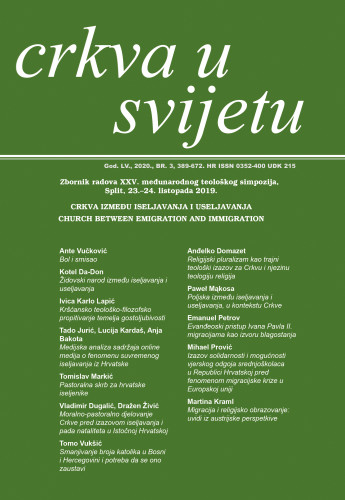Istok Hrvatske danas se suočava sa sve većim valom iseljavanja koji, uz već više desetljeća snažnu depopulaciju, ove krajeve stavlja u vrlo nepovoljnu situaciju. U prvom dijelu rada analiziraju se stoga migracijski trendovi i razmjeri depopulacije kao i najvažniji uzroci koji su doveli do ove situacije te se ističu i neke nužne pronatalitetne i gospodarske mjere. Naime, u razdoblju od 2011. do 2018. godine istočnohrvatske županije ostvarile su negativan saldo vanjske migracije od (najmanje) 46.606 stanovnika, što je u odnosu na ukupan broj stanovnika 2011. godine 5,8 %, pri čemu, očekivano, prednjače Osječko-baranjska i Vukovarsko-srijemska županija. Međutim, neka istraživanja pokazuju da je stvarni broj iseljenih iz Hrvatske u inozemstvo možda i do tri puta veći od službenoga broja. U drugom dijelu rada ističe se važnost moralno-pastoralnog i socijalno-karitativnog djelovanja Crkve, osobito u pronalaženju odgovora na sve češće obiteljske migracije, ali i u iznalaženju novih oblika pastoralne skrbi za iseljene. Crkva je pozvana, s jedne strane, duhovno-pastoralno pratiti one koji su otišli u inozemstvo te im poručiti kako nisu zaboravljeni i da se s radošću čeka njihov povratak, a s druge, pozivati mlade ljude i obitelji da ostanu u svojoj zemlji i tu grade svoju budućnost. Osim toga, u situaciji snažne depopulacije Crkva ima zadaću, snagom svoga proročko-evangelizacijskog poslanja, promicati „evanđelje obitelji” i poticati mentalitet u kojem se dijete promatra kao dar, a ne teret za obitelj. Reorganizacija pastorala braka i obitelji te iznalaženje novih oblika karitativnog djelovanja, nameću se kao prioriteti moralno-pastoralnog djelovanja Crkve.; The east of Croatia is facing an increasing wave of emigration which, with a strong depopulation for several decades, puts these areas in a very unfortunate situation. Therefore, the first part of the paper analyses migration trends and the extent of depopulation as well as the most important causes that led to this situation, and points out some necessary pro-birth and economic measures. Namely, in the period from 2011 to 2018, the eastern Croatian counties achieved a negative balance of external migration of (at least) 46,606 inhabitants, which is 5.8% of the total population in 2011, and, as expected, Osijek-Baranja and Vukovar-Srijem counties are in the lead. However, some researches show that the actual number of emigrants from Croatia abroad is perhaps up to three times higher than the official number. The second part of the paper points out the importance of moral-pastoral and social-charitable activities of the Church, particularly in finding answers to the increasing family migrations, but also in finding new forms of pastoral care for emigrants. On the one hand, the Church is called to spiritually and pastorally accompany those who have gone abroad and to tell them that they are not forgotten and that we look forward to their return, and on the other hand, to invite young people and families to stay in their country and build their future here. Moreover, in a situation of strong depopulation, the Church has the task, by the power of her prophetic-evangelizing mission, to promote the "gospel of the family" and to encourage a mentality in which the child is seen as a gift rather than a burden to the family. The reorganization of the pastoral care of marriage and family and finding the new forms of charitable activities arise as priorities of the moral and pastoral activity of the Church.
Sažetak

 Crkva u svijetu : 55,3(2020) / glavni i odgovorni urednik, editor-in-chief Mladen Parlov.
Crkva u svijetu : 55,3(2020) / glavni i odgovorni urednik, editor-in-chief Mladen Parlov.